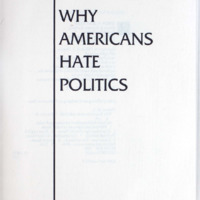-
Title
-
Why Americans hate politics
-
Description
-
Journalist E.J. Dionne of the Washington Post argues that liberal and conservative ideologies since the 1960s have hindered the framing of American issues in ways that would lead to their resolution.
-
Identifier
-
1134758
-
671682555
-
Creator
-
Dionne, E J
-
Source
-
Brian Lamb Booknotes Collection
-
Gift of Brian Lamb, 2011.
-
Catalog record
-
Language
-
eng
-
Date
-
1991
-
Program air date: August 25, 1991.
-
Publisher
-
Simon & Schuster
-
George Mason University. Libraries. Special Collections & Archives
-
Subject
-
"Political participation--United States."
-
"Political campaigns--United States."
-
"Right and left (Political science)"
-
"Conservatism--United States."
-
"Liberalism--United States."
-
Relation
-
Original Booknotes interview
-
Rights
-
This work may be protected by copyright laws and is provided for educational and research purposes only. Any infringing use may be subject to disciplinary action and/or civil or criminal liability as provided by law. If you believe that you are the rights-holder and object to Mason’s use of this image, please contact speccoll@gmu.edu.
-
Text
-
Transcription of Annotations
Notes on front fly sheet: page 355- Hate of Politics, anger -all sides-WHY? Moynihan Conservative Russell Kirk; Buckley Neo Con.; Robert Novak-Goldwater New Left; Koch, Ed Crane Libertarians-273 Von Mises, Murray, Rothbard Neo Liberal; Fusionists Ayn Rand. Notes and underlinings: Upper-middleclass reformers left/right--argued about morality, anticommunism, imperialism, abstract rights--electorate on sidelines wonder why political discussion distant from their concerns. False choices poised by liberals/conservatism makes it difficult for preferences of American people to express themselves in politics. Political process defective. When American political consultants went to guide Eastern Europe in ways of modern politics--alarm. For politics to get better, need recognition that the fragmentation of American society has made public life difficult. Need to tie citizens back into public life. Abortion. Reassert goal of black/white integration. Halt cultural civil war. Gulf War. End of popular hatred of politics will not happen until cultural civil war is settled and political discourse focuses on standard of living, reducing economic pressure of the middle class and restores hope to the poor. Book=interpretive history of thirty years , why liberalism/conservatism have become obstacles to healthy political life. 3 parts. 1. How liberalism got into trouble; 2. Growing problems facing conservatism; 3. Ways of thinking about politics that may help surmount current difficulties. Race, moral/cultural issues around feminism/family. Traditionalists/libertarians--William F. Buckley, Jr. Fusionism. Paradox, conservatives helped by Watergate/Nixon's fall. Nixon only politician who might have made Modern Republicanism work. Conservatism needs failed old liberalism as enemy. Despite respect for/agreement with, conservatism at stage of political/intellectual exhaustion. Need political center to cure hatred of politics--coalition for social reform with broad middle class support. New center likely created by liberals. Liberals do not believe that politics, public life ought to arouse more suspicion than hope. Liberals can learn from conservatives without abandoning most important principles. Waste the 90s if liberals/conservatives spend all their time refighting the meaning of liberal 1960s/conservative 1980s. Russell Kirk. George H. Nash, author of definitive history of conservative intellectual movement after the war. Academy , for conservatives=no less dangerous than the outside world, ruling ideas of liberals/socialists. Friedrich A. von Hayek's The Rad to Serfdom, 1944. Libertarians believe in the importance of individuals, Charles Koch, former member of John Birch Society--converted to libertarianism by writings of Von Mises and guided by Ed Crane. Cato Institute; Institute for Humane Studies. 1988 presidential campaign not moving, except anger, impatience, disgust. Russell Kirk Heritage Institute speech suggests eminent neoconservatives mistook Te Aviv for capital of the US. Richard John Neuhaus. Need new politics of the middleclass. 60s Left/80s Right much in common, mutual hope that politics could liberate potential of individuals/foster benevolent communities. Moralism of left blinded it to sources of middle-class anger--tax burden, rising crime rates. Right misguided moralism, Feminists/Gays. Left/right mired in narrow ideological battles; both mistrusted possible decisions of a democratic electorate. Left relied on courts/right claimed government always the problem. Americans hate politics because lost sense of public good; trust/commitment have eroded along with ideals of democratic citizenship. Voters impatient with George Bush's presidency grew due to his indifference to domestic policy. Black America engulfed by pessimism; rise in black nationalist feeling. Middle class gave up on government for failing basics, education, health care, roads, mass transit, fighting crime. First step to welfare reform is increasing benefits to working poor. Pay back student loans with time vs. money--police work, military, health care for the needy--public service. Savings & loans=another reason to hate politics. Fall of communism= victory for 40 years of foreign policy. Gulf War. Decades of fiscal irresponsibility left US begging for foreign war contributions. Can a nation of brilliant individuals respond to crises collectively? Need to accept efficiencies of market/vigorous public life. New political center must focus on struggle among competing goods. Nation that hates politics will not long survive as a democracy. Learned of politics as child, at home. Taft Republicans--lifelong love for contrarians. Jack Rosenthal. Bob Kaiser, Dave Ignatius. Fred Siegal, Jan Rosenberg, Mary Boyle--DC Metro.
 1134758.pdf
1134758.pdf